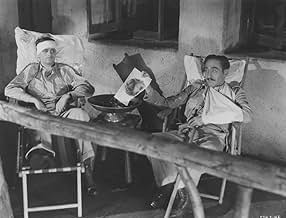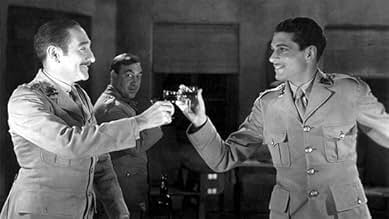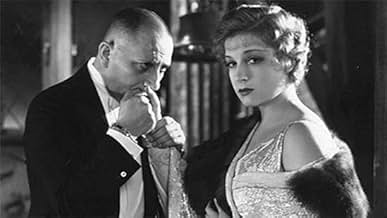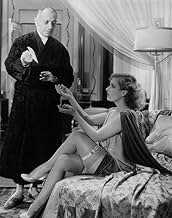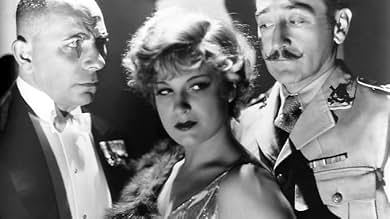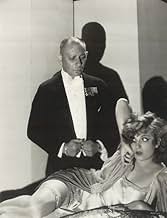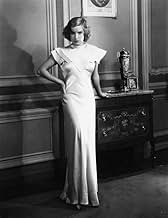Ajouter une intrigue dans votre langueBritish Army Captain Geoff Roberts carries on an affair with Alva, the wife of the cruel Victor Sangrito. Sangrito, however, is well aware of the affair, as he uses his beautiful wife to lur... Tout lireBritish Army Captain Geoff Roberts carries on an affair with Alva, the wife of the cruel Victor Sangrito. Sangrito, however, is well aware of the affair, as he uses his beautiful wife to lure men into romance with her, then blackmailing them to save their careers. When Roberts fa... Tout lireBritish Army Captain Geoff Roberts carries on an affair with Alva, the wife of the cruel Victor Sangrito. Sangrito, however, is well aware of the affair, as he uses his beautiful wife to lure men into romance with her, then blackmailing them to save their careers. When Roberts falls into Sangrito's trap, he pays the blackmail and leaves for India, hoping to forget Alv... Tout lire
- Réalisation
- Scénario
- Casting principal
- General Thomas Armstrong
- (as Frederic Kerr)
- French Maid
- (non crédité)
- Non-com
- (non crédité)
- Party Guest
- (non crédité)
- Bertha - English Barmaid
- (non crédité)
Avis à la une
Adolphe Menjou and Larry Olivier are two of these men, who happen to be friends. Man-of-the-world Menjou does very well with his role of Captain Richards and a very young and dashing Laurence Olivier, is good as well as the more "naive" guy.
Von Stroheim's short moments on the screen are excellent, because he can portray at very close perfection, that sort of middle european aristocratic decadence. Kudos too, for Hugh Herbert's sympathetic performance as Menjou's valet.
Miss Damita (later to be Mrs. Errol Flynn) has poise but lacks acting talent, but is anyway alluring as the tempting lady.
If you like pre-codes, watch it.
A porcelain collector uses his younger wife to ensnare rich army officers, so that he can blackmail them. Two officers, serving in the British army in India, find out that they are both in love with this same woman. That is the plot in a nutshell. The saving feature of this film it to witness some pretty good acting performances. Apart from Hugh Herbert, whose Scottish accent slips like a postman in the snow and sounds about as authentic as the MacFarterchops tartan, the rest of the cast turn in some pretty good performances. Von Stroheim's performance is weird; but then again he is playing a weirdo. Menjou turns in a competent performance - as he always does. Olivier is subtle: you have to watch him carefully to fully appreciate what he does. The same can be said for Damita. Yes, it's great to have a sophisticated leading lady who doesn't mind getting her kit off; but watch her performance next to Olivier in the dining table scene. Further down the cast, the pair who play the general and his sister turn in good performances, too.
The performances of the cast rescue this film, which is of its time. It is watchable.
So what's to like? How can one not enjoy Adolphe Menjou, the epitome of the suave knave, paired off with Laurence Olivier in his fourth film, both doing their best with the weak material to steal their common scenes. It was delicious! Both were magnificent, both were divine and it was so much fun to watch. Especially memorable are the scenes where Olivier describes the cut of coat collar with a swoop of his hand that is pure Sir Laurence. And lets not forget Lili Damita who made up for her utter lack of talent by sensuously gliding through her scenes in her tight fighting, low-cut dresses, seemingly barely able to keep herself from devouring her next male victim.
Oh what a fun way to spend 68 minutes!
In a supporting role, Erich von Stroheim plays a central European porcelain collector who manipulates his wife into seducing British gentlemen so that he can later blackmail them. It seems a shame that he was not given a bigger part, because he has by far the most interesting character and he gives off the liveliest performance in the film, speaking slowly to toy with Adolphe Menjou, and moving about the place in such a cool, leisurely manner that one is constantly hanging on edge. Unbeknown to him, his plans go awry when it turns out that two of the men that his wife has seduced are old friends; this coincidence is obvious and too slowly played out, but the resulting initial resentment followed by acceptance that occurs between the two men is interesting to track.
The film looks like it may have been intended to be a satire, and the coincidences are sort of funny, however there's nothing comical as such about the film other than von Stroheim's appropriately domineering performance and the way that he talks - how he says "passion" with his accent comes out rather humorously. The film does not quite work as a satire, presenting more so things to think about then any definite message, and the transformations and motivations of Lili Damita's seductress character are never clear and seem a bit awkward. Damita herself is not exactly excellent in her role - she is visually striking, but never as charismatic as a femme fatale should be. The rest of the cast are generally fine, as is the overall production. It just falls a little short of being anything really special.
Others have already commented on Miss Damita's strengths (beauty and sex appeal) and weaknesses (no real acting ability), which I believe is a fair assessment of her contributions. Despite her physical charms, I found it difficult to believe that men would be driven to extremes of jealousy over her... which seriously undermines the main premise of the story. And when she chooses Adolphe Menjou over Laurence Olivier... well, that's REALLY straining the bounds of credibility!
Speaking of hard to believe, there's Hugh Herbert, making a pathetically inept attempt at a Scottish accent. (He went on to become a repeat offender, once again inflicting his bogus burr as Detective John McTavish in 1934's EASY TO LOVE). Herbert's recurring "business" about the women in his life gets very tiresome very quickly.
The biggest liability in the film is Adolphe Menjou, woefully miscast as the man who wins Damita's heart over all her other lovers, including a very young, very handsome Laurence Olivier. Scrawny, pinch-faced Menjou was over forty at the time (he looks even older); ludicrously, he is repeatedly referred to by various characters as "young man." It's obvious that the part was written for a younger, sexier actor. Had they cast someone more appropriate, the story would have had a lot more sizzle.
Though I rated the film only four stars, I'd recommend it to die-hard film buffs. Besides von Stroheim's memorable characterization, it's got a nuanced performance by the young Olivier, the lovely Miss Damita (and her equally lovely wardrobe), and some appealingly quirky scenes and performances. It's not great art, but it's good entertainment.
Le saviez-vous
- AnecdotesSackville Street is part of the Savile Row tailoring area in Mayfair in London. Many people are familiar with the idea of the high quality tailoring in Savile Row. "Savile Row", in terms of tailors, is traditionally regarded as including Savile Row itself and a few of the adjoining streets, such as Sackville Street.
- Citations
[first lines]
Captain Geoffrey 'Geoff' Roberts: I suppose you will hate me... now.
Mrs. Alva Sangrito: Hate you? I love you more than ever.
[He takes her hand as they gaze into each other's eyes]
- ConnexionsFeatured in Great Performances: Laurence Olivier: A Life (1983)
Meilleurs choix
Détails
- Date de sortie
- Pays d’origine
- Langue
- Aussi connu sous le nom de
- The Sphinx Has Spoken
- Lieux de tournage
- Société de production
- Voir plus de crédits d'entreprise sur IMDbPro
- Durée1 heure 8 minutes
- Couleur
Contribuer à cette page


